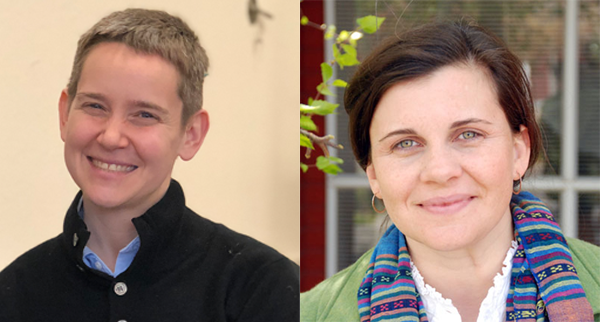MCLAs New Education Professors on Teaching Future Teachers
February 11, 2020

MCLA's two newest education professors, Dr. Clio Stearns (left) and Dr. Maggie Clark (right), began teaching here in August 2019. They both report seeing a lot of passion from their students, and have been impressed with their input and reflections on how education works in the U.S.
As attitudes and practices around education change, so must educators—and the professors who educate them. The two newest members of MCLA’s Education Department, assistant professors Maggie Clark and Clio Stearns, know this well.
Clark, who grew up in Williamstown, went to Williams College, then spent time running an after-school program and teaching young children in California while earning her graduate degree from Sonoma State University and researching childhood social and emotional development. Her master’s thesis examined children’s understanding of the concept of peace, and how they define the term. She earned her Ph.D. from UC Santa Cruz in 2016.
Stearns earned her bachelor’s from Bryn Mawr and a master’s degree from the Bank Street College of Education, and worked as a teacher before completing her Ph.D. in education, curriculum and instruction from the University of New Hampshire in 2017. She taught as a Peace Corps volunteer, spent time teaching English language and literacy to children and adults, and taught undergraduate classes at UNH before coming to MCLA.
Both professors have seen a lot of passion from their students, and have been impressed with their input and reflections on how education works in the U.S.
“I think people become teachers for one of two reasons: they had a great teacher they were inspired by, or they had a negative experience and they want to make change,” said Clark. “I think (teaching education) gives an opportunity to pause, but also to critically reflect: ‘What went well in my schooling? What went well I can carry on?’ When you’ve been a student for 12-13 years, and now you’re looking to become a teacher, there is an identity and perspective shift that needs to happen.”
“My students are very honest about their ideas—and they want to get to work,” said Stearns. “I love the students here. We have an incredible mix of students with so many different experiences and interests and questions and openness—and a willingness to take risks.”
Our view of education is inextricably linked to our views about society, and Clark and Stearns have seen that reflected in their classroom discussions; they each teach a section of MCLA’s Education and Society class, and end up comparing notes. Students have their own ideas and experiences around consent, autonomy, and societal balance of power; they also have ideas about standardized testing, textbooks, and student evaluation.
“In a school, whatever is happening on a national stage is an education issue,” said Stearns. “Teaching is not politically neutral…There is going to be some imparting of your views and your way of being in the world. But it’s important to constantly explore your own biases and be ever more conscious of what you are bringing to the classroom, and how you’re impacting people around you.”
“I think there is a continued awakening to new and different ways of teaching,” said Clark. “I so appreciate their curiosity. I find them very willing to engage in a critical reflection—critical thinking is often at the core of what we are trying to do here—and I think they come in with so many of those skills.”
***
Are you an MCLA student, alum, or faculty member? Do you want MCLA to share your story? Please email Creative and Brand Strategy Manager Francesca Olsen at Francesca.Olsen@mcla.edu.
